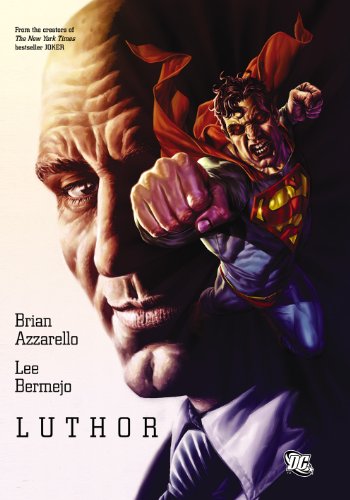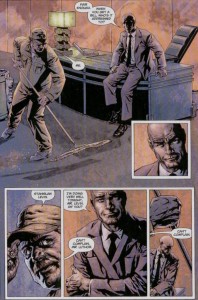![]() Lex Luthor: Man of Steel by Brian Azzarello (writer) & Lee Bermejo (artist)
Lex Luthor: Man of Steel by Brian Azzarello (writer) & Lee Bermejo (artist)
 Though I’m not a big fan of Superman comics, I am fascinated by his overlapping roles in American literature and popular culture. Therefore, I never hesitate to read Superman trades if they come highly recommended, as was Lex Luthor: Man of Steel. Though not as good as some of my other favorites like Superman: Red Son and Superman/Batman: Public Enemies, Lex Luthor: Man of Steel comes close. The decision to tell the story from Luthor’s perspective is a good one, and the comic is made even better because of how well Bermejo’s art reflects Azzarello’s writing.
Though I’m not a big fan of Superman comics, I am fascinated by his overlapping roles in American literature and popular culture. Therefore, I never hesitate to read Superman trades if they come highly recommended, as was Lex Luthor: Man of Steel. Though not as good as some of my other favorites like Superman: Red Son and Superman/Batman: Public Enemies, Lex Luthor: Man of Steel comes close. The decision to tell the story from Luthor’s perspective is a good one, and the comic is made even better because of how well Bermejo’s art reflects Azzarello’s writing.
Since the story of Luthor is given from his own perspective, we must be led to see that Luthor is not evil according to his own ambitions and ideals. I think Azzarello makes a convincing argument that seems consistent with the evil Luthor I recognize from other comics. At the very least, Luthor’s view of himself doesn’t seem incredibly inconsistent with his actions against Superman in all those cartoons I grew up on.
 So why does Luthor hate Superman? According to Azzarello’s Luthor, it’s because of love — love of humanity and the heights we are capable of reaching. Why strive to be great when HE — Superman — will always be better? Azzarello shows us that Luthor’s incredibly large ego is really belief in the greatness of human beings, and Superman dwarfs our potential achievements. It’s fine to be great if you are human — like Luthor — because he inspires others to greatness, but it’s not acceptable to be a SUPERman beyond man because, as Luthor keeps emphasizing in this comic, Superman is NOT a man, and he therefore sets unrealistic expectations for us, expectations that will lead us to view ourselves as failures compared to an alien pretending to be human.
So why does Luthor hate Superman? According to Azzarello’s Luthor, it’s because of love — love of humanity and the heights we are capable of reaching. Why strive to be great when HE — Superman — will always be better? Azzarello shows us that Luthor’s incredibly large ego is really belief in the greatness of human beings, and Superman dwarfs our potential achievements. It’s fine to be great if you are human — like Luthor — because he inspires others to greatness, but it’s not acceptable to be a SUPERman beyond man because, as Luthor keeps emphasizing in this comic, Superman is NOT a man, and he therefore sets unrealistic expectations for us, expectations that will lead us to view ourselves as failures compared to an alien pretending to be human.
All of the above is revealed early in the first of five issues, so I’m not giving anything away here. The real plot involves what Luthor does to demonstrate to Superman, to himself, and to the people of Metropolis that he — Luthor — is correct in his view of Superman. In some ways he succeeds and beats Superman. But his success is a failure and makes him the evil Luthor we all know and love to hate. And Superman’s failure is really his usual success seen from a fresh perspective. I’m being vague here to not give away the plot, but I want to emphasize that the ending leaves much to debate and all readers will not agree with what Azzarello’s final point may be or how successful he is in achieving his goal in this comic. I think this ambiguity increases the comic’s artistic greatness, but other readers, I would imagine, will fault this ending for the very same reasons I like it.
What I can be clear about is how the writing and the art go hand-in-hand to convey Luthor as a likeable man and Superman as a dangerous, all-powerful alien. Early in the first issue, Luthor is shown talking kindly to a janitor in his building and paying him the highest respect as a fellow human being. We even find out that he’s willing to extend kindness to him and his family because they represent the hard-working American to Luthor.
 The art compliments this image of a kindly Luthor by showing him not just talking and acting kindly to people such as his janitor: He is shown smiling and relaxing, a man of great power willing to let his defenses down with people he doesn’t perceive as a threat. His body language is very different before we see our more typical cut-throat Luthor later in the comic. The art depicting Superman forces the reader to him as Luthor does: as a dangerous, violent alien. This book is worth reading if only to see Superman depicted going about his usual routine of saving lives from the perspective of Luthor. He really does look like an evil alien who has only to change his mind momentarily to turn all that unstoppable power on good people and take over America, if not the entire planet (a wonderful premise examined by Mark Waid in Irredeemable). The Boy Scout Superman looks downright frightening in this book, and if you didn’t know a thing about Superman, you wouldn’t like him much after reading this book. However, the real beauty of this depiction is that Superman never acts out of character: He’s serious, he fights against Luthor when he hatches evil plans, and he saves human lives.
The art compliments this image of a kindly Luthor by showing him not just talking and acting kindly to people such as his janitor: He is shown smiling and relaxing, a man of great power willing to let his defenses down with people he doesn’t perceive as a threat. His body language is very different before we see our more typical cut-throat Luthor later in the comic. The art depicting Superman forces the reader to him as Luthor does: as a dangerous, violent alien. This book is worth reading if only to see Superman depicted going about his usual routine of saving lives from the perspective of Luthor. He really does look like an evil alien who has only to change his mind momentarily to turn all that unstoppable power on good people and take over America, if not the entire planet (a wonderful premise examined by Mark Waid in Irredeemable). The Boy Scout Superman looks downright frightening in this book, and if you didn’t know a thing about Superman, you wouldn’t like him much after reading this book. However, the real beauty of this depiction is that Superman never acts out of character: He’s serious, he fights against Luthor when he hatches evil plans, and he saves human lives.
Only the ending of the book bothers me. I like it, and I can see where Azzarello is going, but I just wish he had written — or been allowed to write? — more than five issues. His story is bigger than the number of pages it was given. He even tries to squeeze in a meeting between Lex Luthor and Bruce Wayne, a funny meeting that I enjoyed. Is Wayne more like Luthor in being a human pushing himself to be his best or more like Superman in being a hero? But it just added one more storyline that over-packed a story that should have been given more pages. I can’t help but think this great story could have been excellent. Still, I don’t hesitate to give it just under five stars — to me it’s certainly in the canon of great Superman stories.



I really like this premise! Great review, Brad, you really point up the key issues. Luthor isn’t wrong. And the art work looks great.
Thanks, Marion! Tune in next week for Batman. Same Bat-time, same Bat-Channel!
Nice article. I’ll have to check out the comic!